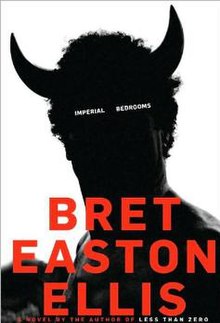Friday, 30 September 2016
Imperial Bedrooms (explicit)
So, if you read my blogpost on "Less Than Zero" you will know exactly where this is heading. A psychedelic movement of transgression, drugs, drugs, more drugs and anti-catharsis for the effect of "the refusal to condone or chastise" behaviours.
I read "Imperial Bedrooms" almost immediately after I finished "Less Than Zero" as this is the second book in that series. It is almost as if we see two sides to Clayton (the narrator of "Less Than Zero" ) Let me tell you, that was a long, long time ago now - but with these emotional scars from witnessing the two sides to Clay (kind of like two face from Batman) - I hope in instructing you that this book is a cult classic that you may go away and read some Bret Easton Ellis. He truly is the greatest of his kind since Anthony Burgess.
Characters:
I have to say that in this one, my favourite character was Clayton "Clay" - I felt as if everything from "Less Than Zero" created new, fresh and protruding scars on his emotions, causing this neo-mental breakdown he has in "Imperial Bedrooms". There's certainly a sense of foreboding and perpetual pessimism in his head, so to get inside there after everything that happened to Julian Wells and Rip and Finn etc. there is gonna be some serious fucked up stuff in there.
Themes:
This divide in Clay and the whole interaction of Clay and the world around him is much easier to understand if you read "Less Than Zero" first. "Imperial Bedrooms" is a reaction to this. Imagine Newton's Law: Every action has an equal and opposite reaction. Take away the "equal and..." part. "Less Than Zero" is the action - most of the required action takes place in this concept that Clayton is completely reliable and one of the lesser monstrosities of the transgressive 80s medium. BUT, in "Imperial Bedrooms" we get a fiery reaction to everything that happened previously and how Clay has, like Frankenstein, become the very monster he tried so hard to prevent. This is why my favourite theme (across the two books) is action and reaction. In the case of "Imperial Bedrooms" there are three: action, reaction and inaction. Inaction being the ideals of pessimism that makes Clay's stream of consciousness sections more of a modern/post-modern Hamlet that anything else. I've gone on enough... sorry.
Storyline:
The storyline is crucial. You have to admit to yourself that Clay is not perfect and not the same guy you met in "Less Than Zero". To admit that is very, very difficult since you put so much faith in him at the beginning of the two books. You have to destroy everything you thought you knew about Clay and - just as he was there for Julian - see it through until the end of the book (where I think you'll be more surprised that you're prepared to be). It's a perfect follow-on to an unstoppable force of "Less Than Zero" - the perpetual haunting of "Imperial Bedrooms" is just one of those books where we have a modern Byronic Hero lugging around the anvil of his past. He doesn't want to let it go out of sentiment - but he constantly blames others for his actions and blames himself for theirs. The confusion, remembrance and troubling locations that place themselves upon the edifice of the 80s (where Clay is concerned) is reduced to a poisoned vein. A bad memory.
Verdict:
I give this book 9.
100% for characters: I loved Clay in the first book - this one puts you through some major commitment issues... You still gotta love Clay.
100% for themes: Action and inaction haven't been so crucially visited since Shakespeare's Hamlet
100% for storyline: A brilliant follow-on as I said. It's an amazing book with some truly gritty thought processes. Psychedelic, yet completely pessimistic, it retains the meaning of the darkness in the 80s.
Subscribe to:
Post Comments (Atom)

No comments:
Post a Comment